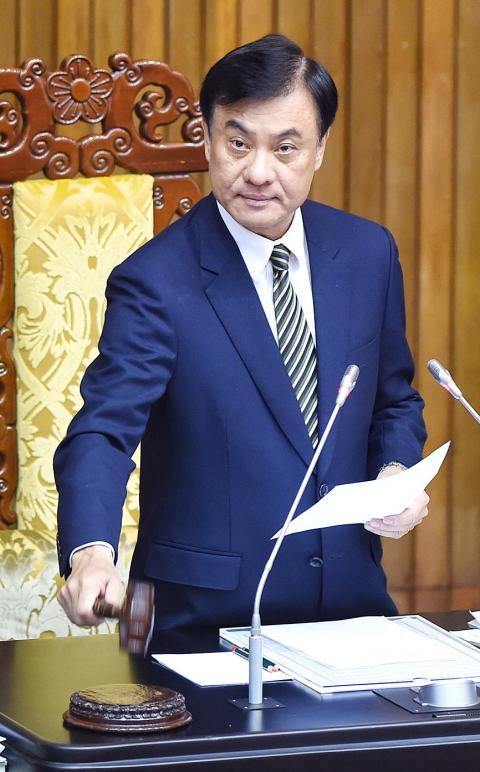Amendments to the Housing Act (住宅法) aimed at assisting young people and disadvantaged groups with accommodation cleared the legislative floor yesterday.
After months of deliberation and negotiations the amendments passed amid applause from the lawmakers and civil groups, while the Ministry of the Interior expressed gratitude.
The changes increase the percentage of social housing reserved for “economically and socially vulnerable” groups to rent from 10 percent to 30 percent, while a portion is to be for those who work or study in a region outside their household registration area.

Photo: Liu Hsin-de, Taipei Times
The qualification criteria for those applying for housing subsidies have also been adjusted, with economically and socially vulnerable groups and applicants who need work done on their homes because of structural concerns prioritized.
The rules offer landlords a tax break if they lease to vulnerable groups and those granted housing subsidies, with rent income to be tax be exempt if it is less than NT$10,000 per abode.
People living in illegally built structures who meet certain conditions qualify for three years of housing subsidies to help them move into legal housing.
Democratic Progressive Party Legislator Wu Yu-chin (吳玉琴), who participated in the amendment process, said the emphasis of this round of amendments was to “lower the threshold for vulnerable groups to find proper housing, raise incentives for leasers to become ‘public welfare landlords,’ write off possible impediments to the construction of social housing and increase the percentage of social welfare facilities in the process of building social housing.”
KMT Legislator Sra Kacaw (鄭天財), an Amis, thanked the legislature and his colleagues for adding clauses that guarantee Aborigines improved benefits, including a percentage of social housing not lower than the ratio of the number of Aborigines to the overall population.
He said the guarantee is crucial, as the percentage of Aborigines who own houses is much lower than the national average, while the difference is even greater in the six special municipalities.
Minister of the Interior Yeh Jiunn-rong (葉俊榮) expressed gratitude to the legislature after the amendments were passed, saying that while lawmakers have different opinions on the percentage of social housing to be guaranteed for vulnerable groups, the ministry’s version won their support.
It has been a concern of lawmakers from regions outside the six special municipalities that social housing might become a perk for city dwellers, but the ministry should strive to create a mechanism to accommodate the needs in different areas, Yeh said.
Taiwan has only 7,281 homes that are “rent only” social housing, which is only 0.08 percent of the national total, the ministry said.
It is ostensibly lower than the 5 percent in Japan and South Korea and the 30 percent in European countries, it said.
Additional reporting by CNA

CHAOS: Iranians took to the streets playing celebratory music after reports of Khamenei’s death on Saturday, while mourners also gathered in Tehran yesterday Iranian Supreme Leader Ayatollah Ali Khamenei was killed in a major attack on Iran launched by Israel and the US, throwing the future of the Islamic republic into doubt and raising the risk of regional instability. Iranian state television and the state-run IRNA news agency announced the 86-year-old’s death early yesterday. US President Donald Trump said it gave Iranians their “greatest chance” to “take back” their country. The announcements came after a joint US and Israeli aerial bombardment that targeted Iranian military and governmental sites. Trump said the “heavy and pinpoint bombing” would continue through the week or as long

TRUST: The KMT said it respected the US’ timing and considerations, and hoped it would continue to honor its commitments to helping Taiwan bolster its defenses and deterrence US President Donald Trump is delaying a multibillion-dollar arms sale to Taiwan to ensure his visit to Beijing is successful, a New York Times report said. The weapons sales package has stalled in the US Department of State, the report said, citing US officials it did not identify. The White House has told agencies not to push forward ahead of Trump’s meeting with Chinese President Xi Jinping (習近平), it said. The two last month held a phone call to discuss trade and geopolitical flashpoints ahead of the summit. Xi raised the Taiwan issue and urged the US to handle arms sales to

State-run CPC Corp, Taiwan (CPC, 台灣中油) yesterday said that it had confirmed on Saturday night with its liquefied natural gas (LNG) and crude oil suppliers that shipments are proceeding as scheduled and that domestic supplies remain unaffected. The CPC yesterday announced the gasoline and diesel prices will rise by NT$0.2 and NT$0.4 per liter, respectively, starting Monday, citing Middle East tensions and blizzards in the eastern United States. CPC also iterated it has been reducing the proportion of crude oil imports from the Middle East and diversifying its supply sources in the past few years in response to geopolitical risks, expanding

Pro-democracy media tycoon Jimmy Lai’s (黎智英) fraud conviction and prison sentence were yesterday overturned by a Hong Kong court, in a surprise legal decision that comes soon after Lai was jailed for 20 years on a separate national security charge. Judges Jeremy Poon (潘兆初), Anthea Pang (彭寶琴) and Derek Pang (彭偉昌) said in the judgement that they allowed the appeal from Lai, and another defendant in the case, to proceed, as a lower court judge had “erred.” “The Court of Appeal gave them leave to appeal against their conviction, allowed their appeals, quashed the convictions and set aside the sentences,” the judges